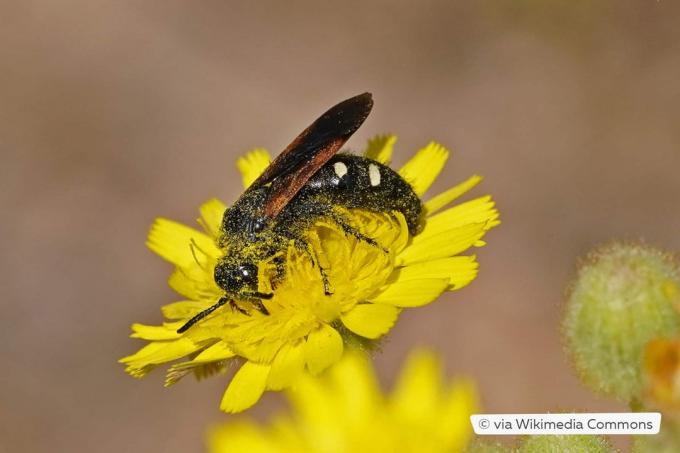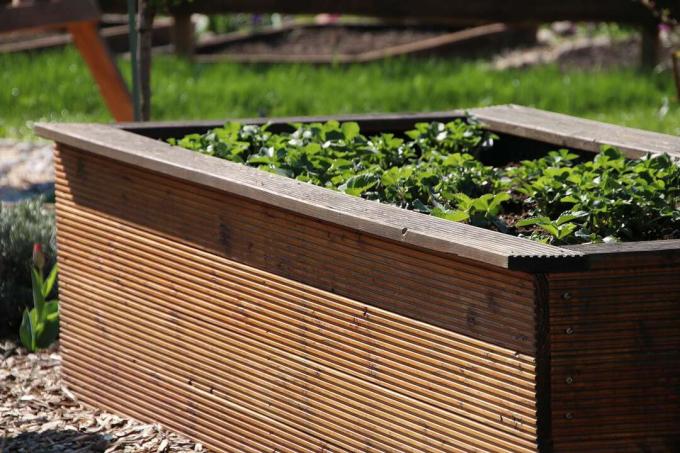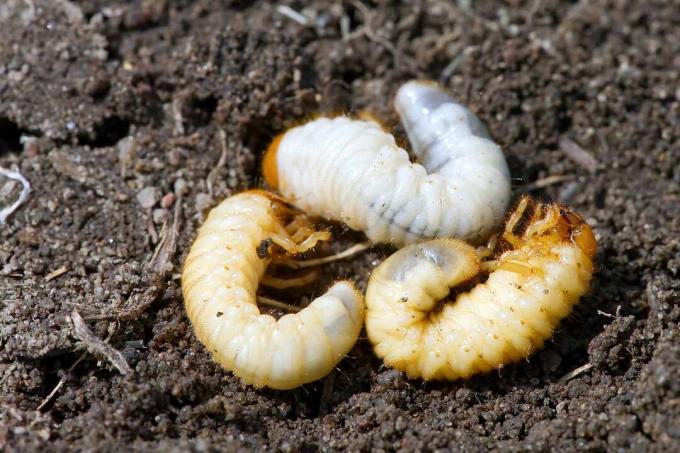
Dirk wasps are very rare visitors to the garden. Nevertheless, the beautiful insects can sometimes be observed in the garden and the question arises as to whether they cause harm or are beneficial.
In a nutshell
- Dirk wasps are very rare
- are larger than other wasps and often black in color
- in the garden they often stay near organic material
- there are the host animals for their larvae
- Dirk wasps are neither pests nor real beneficial insects
Table of contents
- frequency and occurrence
- The appearance of the dagger wasps
- Dirk wasps in the garden
- Do dagger wasps cause damage?
- Usefulness of the dagger wasps
- Lure dagger wasps into the garden
- Creating habitats for beetles
- frequently asked Questions
frequency and occurrence
In Germany there are only two species of dagger wasps:
- Bristly dagger wasp (Scolia hirta)
- Scolia sex maculata

These species are only found in certain regions. Therefore, the insects are protected with us. Due to climate change, however, the warmth-loving wasps are finding better and better living conditions and are multiplying more frequently. They use warm, sunny, and dry habitats with sandy soils and fly in the summer months.
The appearance of the dagger wasps
Dagger wasps are similar in appearance to other wasp species, but are often much larger. They are also completely black in color and have two yellow bands on their abdomen. The wings shine bluish.

Dirk wasps in the garden
Provided it is a warmer to hot garden, dagger wasps may be present in some places. Especially where they suspect food for their larvae. The larvae feed exclusively on the larvae of different beetle species. These include, for example, the grubs from rose beetles. Therefore, the dagger wasps prefer to visit the following places in the garden:
- raised beds
- compost heap
- pile of deadwood
- dead tree stumps
- other places with suitable organic material, which beetle larvae prefer

Do dagger wasps cause damage?
Neither the adults nor the larvae cause any damage in the garden. They don't gnaw on wood or eat plants. In addition, they do not harm any beneficial insects in the garden. The larvae live in the ground, but do not eat plant roots. Instead, female dagger wasps lay their eggs near one beetle larva off or even into the beetle larva itself. When the wasp larva hatches, it eats its host.
A notice: They only become a nuisance to humans in exceptional cases, when there are so many wasps in the garden that they pose an apparent threat.
Usefulness of the dagger wasps
Although the dagger wasp larvae eat grubs, they are not among the insects that have any real use in the garden. On the one hand because they are far too rare and on the other hand because they are food specialists. This means they only eat certain beetle larvae. This also includes a few pests (e.g. cockchafers), but also many types of beetles, which are so rare that they are protected.

Lure dagger wasps into the garden
If you would like to see the rare insects in the garden more often, there are a few useful things you can try to attract them.
Food plants for the adult wasps:
- bluish flowers seem to be preferred
- thyme
- speedwell
Creating habitats for beetles
- compost heap create and regularly fill with plant remains
- leave dead wood in the garden and let it rot
- Distribute tree stumps or tree roots in the garden, drill larger holes if necessary
- Lay out heaps of brushwood and leaves in sheltered corners or leave
- flowering plants plant for insects, many adult beetles feed on nectar and pollen
Hints: However, all these measures can also attract harmful beetles into the garden.
frequently asked Questions
Although females have a stinger, they usually do not sting, and when they do, it is less painful than other wasp species. The insects are not aggressive towards humans and they are not poisonous either.
Dirk wasps are not social insects. However, in suitable habitats, they can occur in groups, especially during the breeding season. However, they do not build nests or anything like that.
The adult dagger wasps often visit flowers because they need nectar to successfully reproduce.


